仁爱英语七年级上册unit4topic1知识点及练习
仁爱英语七年级上册unit4topic1知识点及练习
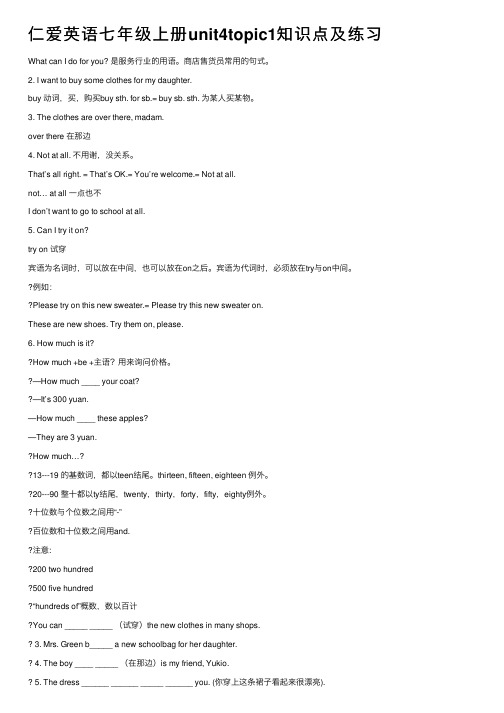
仁爱英语七年级上册unit4topic1知识点及练习What can I do for you? 是服务⾏业的⽤语。
商店售货员常⽤的句式。
2. I want to buy some clothes for my daughter.buy 动词,买,购买buy sth. for sb.= buy sb. sth. 为某⼈买某物。
3. The clothes are over there, madam.over there 在那边4. Not at all. 不⽤谢,没关系。
That’s all right. = That’s OK.= You’re welcome.= Not at all.not… at all ⼀点也不I don’t want to go to school at all.5. Can I try it on?try on 试穿宾语为名词时,可以放在中间,也可以放在on之后。
宾语为代词时,必须放在try与on中间。
例如:Please try on this new sweater.= Please try this new sweater on.These are new shoes. Try them on, please.6. How much is it?How much +be +主语?⽤来询问价格。
—How much ____ your coat—It’s 300 yuan.—How much ____ these apples?—They are 3 yuan.How much…13---19 的基数词,都以teen结尾。
thirteen, fifteen, eighteen 例外。
20---90 整⼗都以ty结尾,twenty,thirty,forty,fifty,eighty例外。
⼗位数与个位数之间⽤“-”百位数和⼗位数之间⽤and.注意:200 two hundred500 five hundred“hundreds of”概数,数以百计You can _____ _____ (试穿)the new clothes in many shops.3. Mrs. Green b_____ a new schoolbag for her daughter.4. The boy ____ _____ (在那边)is my friend, Yukio.5. The dress ______ ______ _____ ______ you. (你穿上这条裙⼦看起来很漂亮).1. I have three ______ yuan.A.hundredsB. a hundredC. hundredD. hundreds of2. --- The pink cap is nice on you. And it’s only twenty yuan now. --- That’s fine. ______.A.How much is it?B.Not at all.C. I’ll take it.D. Can I try it on?3. --- Can I help you, madam?--- I want a pen ____ my son.A.atB. onC. withD. for4. How much ____ those pants?A. amB. isC. areD. be5. This is a new kind of dress. You can try ______.A. on itB. it onC. in itD. it in2. How do you like the pants?How do you like…? 表⽰对某物的看法。
Unit+4+Topic1+SectionA+课件+2023-2024学年仁爱版英语七年级上册
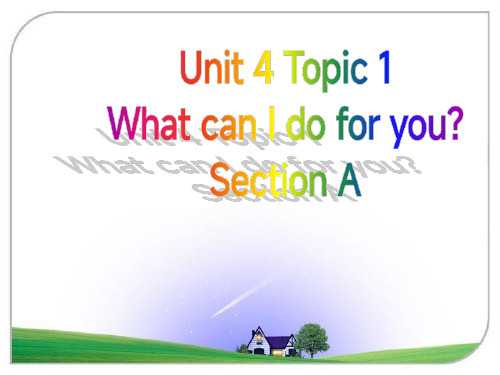
Listen and match the clothes with the
right prices.
(录音P82-2b)
cap
skirt
T-shirt
1. ¥18.00
¥80.00
2. ¥16.00
¥60.00
3. ¥17.00
¥70.00
pants
4. ¥15.00
¥50.00
散步
秋天
已经
八月
Key points:
4. I want to buy some clothes for my daughter. 我想为我女儿买些衣服。
buy sth. for sb.=buy sb. sth. 为某人买某物
如:She wants to buy some flowers for me. = She wants to buy me some flowers.
Look, listen and say.
Salesman: May I help you? Mother: Yes, please. I like the red coat. Can I try it on? Salesman: Sure. (Maria tries on the coat. Mother: Wow! It looks very nice on you. How much is it? Salesman: It's seventy yuan, madam. Mother: That's fine.We'll take it.
30 thirty 40 forty 50 fifty 60 sixty 70 seventy 80 eighty 90 ninety 100 one hundred/a hundred 101 one hundred and one 184 one hundred and eighty-
仁爱版七年级上册英语笔记Unit3Topic3-Unit4Topic1知识点总结

仁爱版七年级上册英语笔记Unit3Topic3-Unit4Topic1知识点总结U 3 T3—U4 T11.1)would like = wantwould like没有人称和数的变化I would like an egg.=I want an egg.He would like an egg.= He wants an egg.(would like不能加s)2)would like to do = want to doa. He would like to drink some water.(drink)=He wants to drink some water.b. She would like (visit) the Great Wall.=She the Great Wall.3)I would like=I’d like He would like=He’d like4)a. I’d like an egg.(一般疑问句) Would you like an egg?Yes,please./ No,thanks.b. He’d like a hamburger.he a hamburger?. / .5)Would you like some chicken?(用some 加强语气,表示强调)6)I’d like an egg.What would you like?He’d like some fish.he ?2.1)you—yourself(反身代词)2)yoursel f---yoursel ves(pl.)3.help yourself/yourselves to +n.:随便吃……a. Help yourself (you) to some chicken, Tom.b. Help yourselves (you) to some chicken, kids.4.1)可数名词[C]:有单数和复数的形式.2)不可数名词[UC]:一般没有复数的形式.3)常见的不可数名词有:milk,rice,fish(鱼肉),chicken(鸡肉),(apple/orange) juice,water,bread5.fish:1)作为“鱼” , 是可数名词.fish—fish(pl.)2)作为“鱼肉”, 是不可数名词.some fish6.chicken:1)作为“鸡” , 是可数名词.a chicken2)作为“鸡肉”, 是不可数名词.some chicken7.some + n.(pl.),some+ [UC]some eggssome fish/chicken/milk/apple juice/rice8.---Help yourselves.---Thank you.9.---Would you like…? ---Yes, please. /No, thanks.10.What/How about +sb(宾格)/sth?What about him/her/some milk?11.All right.行,好吧(表示对别人的建议表示赞同)---I’d like some rice and chicken.---All right./doc/6e6981861.html,k for me.13.Me,too.14.表示建议:---What about …? ---Good idea.15.an ideaa good ideaHomework:1.I’d like a hamburger.(一般疑问句) a hamburger?(肯否回答) ./ .2.She’d like some orange juice.she ?3. , boys and girls.(随便吃些鸡肉吧)4.She likes it very much.(否)She it .5..(我想喝些牛奶).6.他们怎么样?Unit 3 T 3 Section B—D1.1)usually:70-80%,often:50-60%2)usually,often放在be之后,行为动词之前.I usually have breakfast at home.2.have…for breakfast/lunch/supper/dinner1)He usually has an egg and some milk for breakfast.2)We usually have some rice and chicken for supper.3.一日三餐前不加a/an/the,后不加s.What do you usually have for/ breakfast?4.1)He usually has some bread for lunch.What does he usually have for lunch?2)We usually have some juice and fish for dinner. usuallyfor dinner?5.have:1)有2)吃,喝:have milk/bread6.[UC]前面不加a/an/the,后不加s.He has / milk and/ bread for breakfast.7.What/How about +sb(宾格)/sth?8.with带着/有,(表示伴随关系)have chicken/fish with vegetables9.some rice10.three meals(餐):breakfast,lunch,supper/dinner11.food:[UC],食物的总称,作主语,谓语用单数.My favorite food is (be) chicken and fish.12.Chinese /English food13.wait(v.)—waiter(指人)(男服务员)---waitress(女服务员)14.take one’s orderMay I take your order?15.something to drink/eat1)修饰词如不定式(to do) ,形容词修饰something时,放在something之后.2)something:某事(肯定句)anything:任何事(否/疑问)nothing:没有什么事(表否定意思的陈述句)3)Would you like +something?Would you likesomething to eat ?16.[UC]表示数量的表达法:1)a glass of apple juice/watera bag of rice /milk2)a glass of apple juice---two/some glasses of apple juice3) a bag of milk---five bags of milk17.wait/just a moment18.Let me see.让我想一想.I see. 我明白了.19.1)Would you like some vegetables?2)some vegetables/rice20.something to drink21.banana juice----Section C1.eat out2.eat---eating(现在分词)3.would like to doWould you like to have (have) dinner with me?4.have / breakfast/lunch/supper/dinner5.with sb(宾格)6.Would you like to have lunch with him?7.Yes, I’d like/love to.(to不能省略)8.1)May/can I help you?=What can I do for you?2)情态动词may/can/could+动原May I help (help) you?9.sir—madam(对应词)10.What would you liketo eat (eat)?11.Why not+动原? =Why don’t you +动原?Why not study (study) with me? = Why don’t you study with me?12.表示建议:1)What about…? 2)Why not…?肯定回答:Good idea.13.Here you are.14.---Would you like sth to drink?---Yes,please./No,thanks.Section D1.in+地点: in China2.many+n(pl.)many friends3.1)all,bothall指三者或三者以上“都”both指两者“都”2)all,both放在be之后,行为动词之前They are all students.We all like school.4.be kind to sbThe teacher is kind to us.5.have dinner with them6.such as +若干例子7.Sichuan food8.be glad to do sthObama is glad to visit (visit) the Great Wall.9.1)here,there是介词,前不加介词.2)be here/thereI’m glad to be (be) here.10.let sb do sthLet me (I) see (see).Homework:1.他晚饭通常吃什么?he usually2.你可以点菜了吗?3.Tom,为什么不随便吃些汉堡包呢,?,Tom?4.你想喝些什么东西吗?来两杯香蕉汁. Would you like.5.She’s glad (be) there.6.I’d like (work) with you.7.Would you like something (say)?8.Why not (tell) him about it.= him about it.9.他对我很友善.He .10.I usually have some rice for lunch. usually for lunch?1.---Do you like…?---Yes, I like …very much/a lot/a little. (No, I don’t like …at all.)Section D1.at / homeHe has a dog at home.2.it’s, its(它是)(它的)a cat. name’s Mimi.3.Tommy =T om4.Zhou Lan likes it a lot.= Zhou Lan likes it very much. (否)Zhou Lan doesn’t li ke it at all.5.some,anyShe has some pets.(否)She doesn’t have any pets.(疑问)Does she have any pets?6.1)人称代词:主格---宾格I—me,you-you,he-him,she-her,it-itwe-us,they-them2)形物代—名物代my-mine,your-yours,his-his,her-hers,its-its,our-ours,their-theirsThis is a girl. name is Lily. is twelve. We like .(Her,She,her) Unit 4 T1 Section A1.What can I do for you?=Can/May I help you?2.madam---sir(对应词)3.want to do = would like to do1)She wants to have milk and bread.=She would like to have milk and bread.2)Would you like a glass of apple juice?=Do you want a glass of apple juice?3)Would she like some vegetables?=Does she want any vegetables?4.clothes:衣服的总称,复数名词,作主语时,谓语用复数形式。
仁爱版七年级上册英语笔记 Unit3 Topic3-Unit4 Topic1知识点

U 3 T3—U4 T11.1)would like = wantwould like没有人称和数的变化I would like an egg.=I want an egg.He would like an egg.= He wants an egg.(would like不能加s)2)would like to do = want to doa. He would like to drink some water.(drink)=He wants to drink some water.b. She would like (visit) the Great Wall.=She the Great Wall.3)I would like=I’d like He would like=He’d like4)a. I’d like an egg.(一般疑问句) Would you like an egg?Yes,please./ No,thanks.b. He’d like a hamburger.he a hamburger?. / .5)Would you like some chicken?(用some 加强语气,表示强调)6)I’d like an egg.What would you like?He’d like some fish.he ?2.1)you—yourself(反身代词)2)yoursel f---yoursel ves(pl.)3.help yourself/yourselves to +n.:随便吃……a. Help yourself (you) to some chicken, Tom.b. Help yourselves (you) to some chicken, kids.4.1)可数名词[C]:有单数和复数的形式.2)不可数名词[UC]:一般没有复数的形式.3)常见的不可数名词有:milk,rice,fish(鱼肉),chicken(鸡肉),(apple/orange) juice,water,bread5.fish:1)作为“鱼” , 是可数名词.fish—fish(pl.)2)作为“鱼肉”, 是不可数名词.some fish6.chicken:1)作为“鸡” , 是可数名词.a chicken2)作为“鸡肉”, 是不可数名词.some chicken7.some + n.(pl.),some+ [UC]some eggssome fish/chicken/milk/apple juice/rice8.---Help yourselves.---Thank you.9.---Would you like…? ---Yes, please. /No, thanks.10.What/How about +sb(宾格)/sth?What about him/her/some milk?11.All right.行,好吧(表示对别人的建议表示赞同)---I’d like some rice and chicken.---All right.k for me.13.Me,too.14.表示建议:---What about …? ---Good idea.15.an ideaa good ideaHomework:1.I’d like a hamburger.(一般疑问句) a hamburger?(肯否回答) ./ .2.She’d like some orange juice.she ?3. ,boys and girls.(随便吃些鸡肉吧)4.She likes it very much.(否)She it . 5..(我想喝些牛奶).6.他们怎么样??Unit 3 T 3 Section B—D1.1)usually:70-80%,often:50-60%2)usually,often放在be之后,行为动词之前.I usually have breakfast at home.2.have…for breakfast/lunch/supper/dinner1)He usually has an egg and some milk for breakfast.2)We usually have some rice and chicken for supper.3.一日三餐前不加a/an/the,后不加s.What do you usually have for/ breakfast?4.1)He usually has some bread for lunch.What does he usually have for lunch?2)We usually have some juice and fish for dinner.usuallyfor dinner?5.have:1)有2)吃,喝:have milk/bread6.[UC]前面不加a/an/the,后不加s.He has / milk and/ bread for breakfast.7.What/How about +sb(宾格)/sth?8.with带着/有,(表示伴随关系)have chicken/fish with vegetables9.some rice10.three meals(餐):breakfast,lunch,supper/dinner11.food:[UC],食物的总称,作主语,谓语用单数.My favorite food is (be) chicken and fish.12.Chinese /English food13.wait(v.)—waiter(指人)(男服务员)---waitress(女服务员)14.take one’s orderMay I take your order?15.something to drink/eat1)修饰词如不定式(to do) ,形容词修饰something时,放在something之后.2)something:某事(肯定句)anything:任何事(否/疑问)nothing:没有什么事(表否定意思的陈述句)3)Would you like +something?Would you likesomething to eat ?16.[UC]表示数量的表达法:1)a glass of apple juice/watera bag of rice /milk2)a glass of apple juice---two/some glasses of apple juice3) a bag of milk---five bags of milk17.wait/just a moment18.Let me see.让我想一想.I see. 我明白了.19.1)Would you like some vegetables?2)some vegetables/rice20.something to drink21.banana juice----Section C1.eat out2.eat---eating(现在分词)3.would like to doWould you like to have (have) dinner with me?4.have / breakfast/lunch/supper/dinner5.with sb(宾格)6.Would you like to have lunch with him?7.Yes, I’d like/love to.(to不能省略)8.1)May/can I help you?=What can I do for you?2)情态动词may/can/could+动原May I help (help) you?9.sir—madam(对应词)10.What would you liketo eat (eat)?11.Why not+动原? =Why don’t you +动原?Why not study (study) with me? = Why don’t you study with me?12.表示建议:1)What about…? 2)Why not…?肯定回答:Good idea.13.Here you are.14.---Would you like sth to drink?---Yes,please./No,thanks.Section D1.in+地点: in China2.many+n(pl.)many friends3.1)all,bothall指三者或三者以上“都”both指两者“都”2)all,both放在be之后,行为动词之前They are all students.We all like school.4.be kind to sbThe teacher is kind to us.5.have dinner with them6.such as +若干例子7.Sichuan food8.be glad to do sthObama is glad to visit (visit) the Great Wall.9.1)here,there是介词,前不加介词.2)be here/thereI’m glad to be (be) here.10.let sb do sthLet me (I) see (see).Homework:1.他晚饭通常吃什么?he usually?2.你可以点菜了吗??3.Tom,为什么不随便吃些汉堡包呢,?,Tom?4.你想喝些什么东西吗?来两杯香蕉汁.Would you like?.5.She’s glad (be) there.6.I’d like (work) with you.7.Would you like something(say)?8.Why not (tell) him about it.= him about it.9.他对我很友善.He .10.I usually have some rice for lunch.usually for lunch?1.---Do you like…?---Yes, I like …very much/a lot/a little.(No, I don’t like …at all.)Section D1.at / homeHe has a dog at home.2.it’s, its(它是)(它的)a cat. name’s Mimi.3.Tommy =Tom4.Zhou Lan likes it a lot.= Zhou Lan likes it very much.(否)Zhou Lan doesn’t like it at all.5.some,anyShe has some pets.(否)She doesn’t have any pets.(疑问)Does she have any pets?6.1)人称代词:主格---宾格I—me,you-you,he-him,she-her,it-itwe-us,they-them2)形物代—名物代my-mine,your-yours,his-his,her-hers,its-its,our-ours,their-theirsThis is a girl. name is Lily. is twelve. We like .(Her,She,her)Unit 4 T1 Section A1.What can I do for you?=Can/May I help you?2.madam---sir(对应词)3.want to do = would like to do1)She wants to have milk and bread.=She would like to have milk and bread.2)Would you like a glass of apple juice?=Do you want a glass of apple juice?3)Would she like some vegetables?=Does she want any vegetables?4.clothes:衣服的总称,复数名词,作主语时,谓语用复数形式。
Unit 4 Topic 1【复习课件】 七年级英语上册单元复习(仁爱版)

(视频P81-1a)
Q: How much is the coat?
(视频P81-1a)
√ 1. Mother wants to buy _______ (shoes, clothes, gloves) for Maria.
√ 2. Maria likes _________ (the red coat, the yellow skirt, the yellow coat).
英
语
仁爱版 七年级 上册
Unit4 Having Fun 1.What can I do for you?
1.What can I do for you?
一、词汇
A. 数词
1. 三十 thirty
2. 四十 forty
3. 五十 fifty
4. 六十 sixty
7. 九十 ninety B. 计量单位的名词
No, I don’t want ___a_n_y______ oranges. 2. Do you have ____a_n_y_____ vegetables?
Yes, we have ____s_o_m__e_____. 3. My mother needs a few things, she needs ___s_o_m_e_____ milk and
How do you like the pants?
6. 你在开玩笑吗?
Are you kidding?
7. 无论如何谢谢你。 Thank you all the same.
8. 就这些?我想是的。 Is that all? I think so.
口语运用(复习购物) A: _W__h__a_t _c_a_n_I_d__o_f_o_r_y_o_u_?_________________ B: I want to buy a dress for my daughter. A: _W__h__a_t _c_o_lo_r__w_o_u_l_d_y_o_u__li_k_e_/_d_o__y_o_u_w__a_n_t?__ B: Pink. A: What do you think of this one? B: OK. __H_o_w__m__u_c_h_i_s_i_t_?____________________ A: One hundred yuan. B: That’s fine. __I’_l_l _ta_k__e_it_._________________
仁爱版七年级上册英语笔记 Unit3 Topic3-Unit4 Topic1知识点总结

U 3 T3—U4 T11.1)would like = wantwould like没有人称和数的变化I would like an egg.=I want an egg.He would like an egg.= He wants an egg.(would like不能加s)2)would like to do = want to doa. He would like to drink some water.(drink)=He wants to drink some water.b. She would like (visit) the Great Wall.=She the Great Wall.3)I would like=I’d like He would like=He’d like4)a. I’d like an egg.(一般疑问句) Would you like an egg?Yes,please./ No,thanks.b. He’d like a hamburger.he a hamburger?. / .5)Would you like some chicken?(用some 加强语气,表示强调)6)I’d like an egg.What would you like?He’d like some fish.he ?2.1)you—yourself(反身代词)2)yoursel f---yoursel ves(pl.)3.help yourself/yourselves to +n.:随便吃……a. Help yourself (you) to some chicken, Tom.b. Help yourselves (you) to some chicken, kids.4.1)可数名词[C]:有单数和复数的形式.2)不可数名词[UC]:一般没有复数的形式.3)常见的不可数名词有:milk,rice,fish(鱼肉),chicken(鸡肉),(apple/orange) juice,water,bread5.fish:1)作为“鱼” , 是可数名词.fish—fish(pl.)2)作为“鱼肉”, 是不可数名词.some fish6.chicken:1)作为“鸡” , 是可数名词.a chicken2)作为“鸡肉”, 是不可数名词.some chicken7.some + n.(pl.),some+ [UC]some eggssome fish/chicken/milk/apple juice/rice8.---Help yourselves.---Thank you.9.---Would you like…? ---Yes, please. /No, thanks.10.What/How about +sb(宾格)/sth?What about him/her/some milk?11.All right.行,好吧(表示对别人的建议表示赞同)---I’d like some rice and chicken.---All right.k for me.13.Me,too.14.表示建议:---What about …? ---Good idea.15.an ideaa good ideaHomework:1.I’d like a hamburger.(一般疑问句) a hamburger?(肯否回答) ./ .2.She’d like some orange juice.she ?3. , boys and girls.(随便吃些鸡肉吧)4.She likes it very much.(否)She it .5..(我想喝些牛奶).6.他们怎么样??Unit 3 T 3 Section B—D1.1)usually:70-80%,often:50-60%2)usually,often放在be之后,行为动词之前.I usually have breakfast at home.2.have…for breakfast/lunch/supper/dinner1)He usually has an egg and some milk for breakfast.2)We usually have some rice and chicken for supper.3.一日三餐前不加a/an/the,后不加s.What do you usually have for/ breakfast?4.1)He usually has some bread for lunch.What does he usually have for lunch?2)We usually have some juice and fish for dinner.usuallyfor dinner?5.have:1)有2)吃,喝:have milk/bread6.[UC]前面不加a/an/the,后不加s.He has / milk and/ bread for breakfast.7.What/How about +sb(宾格)/sth?8.with带着/有,(表示伴随关系)have chicken/fish with vegetables9.some rice10.three meals(餐):breakfast,lunch,supper/dinner11.food:[UC],食物的总称,作主语,谓语用单数.My favorite food is (be) chicken and fish.12.Chinese /English food13.wait(v.)—waiter(指人)(男服务员)---waitress(女服务员)14.take one’s orderMay I take your order?15.something to drink/eat1)修饰词如不定式(to do) ,形容词修饰something时,放在something之后.2)something:某事(肯定句)anything:任何事(否/疑问)nothing:没有什么事(表否定意思的陈述句)3)Would you like +something?Would you likesomething to eat ?16.[UC]表示数量的表达法:1)a glass of apple juice/watera bag of rice /milk2)a glass of apple juice---two/some glasses of apple juice3) a bag of milk---five bags of milk17.wait/just a moment18.Let me see.让我想一想.I see. 我明白了.19.1)Would you like some vegetables?2)some vegetables/rice20.something to drink21.banana juice----Section C1.eat out2.eat---eating(现在分词)3.would like to doWould you like to have (have) dinner with me?4.have / breakfast/lunch/supper/dinner5.with sb(宾格)6.Would you like to have lunch with him?7.Yes, I’d like/love to.(to不能省略)8.1)May/can I help you?=What can I do for you?2)情态动词may/can/could+动原May I help (help) you?9.sir—madam(对应词)10.What would you liketo eat (eat)?11.Why not+动原? =Why don’t you +动原?Why not study (study) with me? = Why don’t you study with me?12.表示建议:1)What about…? 2)Why not…?肯定回答:Good idea.13.Here you are.14.---Would you like sth to drink?---Yes,please./No,thanks.Section D1.in+地点: in China2.many+n(pl.)many friends3.1)all,bothall指三者或三者以上“都”both指两者“都”2)all,both放在be之后,行为动词之前They are all students.We all like school.4.be kind to sbThe teacher is kind to us.5.have dinner with them6.such as +若干例子7.Sichuan food8.be glad to do sthObama is glad to visit (visit) the Great Wall.9.1)here,there是介词,前不加介词.2)be here/thereI’m glad to be (be) here.10.let sb do sthLet me (I) see (see).Homework:1.他晚饭通常吃什么?he usually?2.你可以点菜了吗??3.Tom,为什么不随便吃些汉堡包呢,?,Tom?4.你想喝些什么东西吗?来两杯香蕉汁.Would you like?.5.She’s glad (be) there.6.I’d like (work) with you.7.Would you like something(say)?8.Why not (tell) him about it.= him about it.9.他对我很友善.He .10.I usually have some rice for lunch.usually for lunch?1.---Do you like…?---Yes, I like …very much/a lot/a little.(No, I don’t like …at all.)Section D1.at / homeHe has a dog at home.2.it’s, its(它是)(它的)a cat. name’s Mimi.3.Tommy =Tom4.Zhou Lan likes it a lot.= Zhou Lan likes it very much.(否)Zhou Lan doesn’t like it at all.5.some,anyShe has some pets.(否)She doesn’t have any pets.(疑问)Does she have any pets?6.1)人称代词:主格---宾格I—me,you-you,he-him,she-her,it-itwe-us,they-them2)形物代—名物代my-mine,your-yours,his-his,her-hers,its-its,our-ours,their-theirsThis is a girl. name is Lily. is twelve. We like .(Her,She,her)Unit 4 T1 Section A1.What can I do for you?=Can/May I help you?2.madam---sir(对应词)3.want to do = would like to do1)She wants to have milk and bread.=She would like to have milk and bread.2)Would you like a glass of apple juice?=Do you want a glass of apple juice?3)Would she like some vegetables?=Does she want any vegetables?4.clothes:衣服的总称,复数名词,作主语时,谓语用复数形式。
仁爱版英语七年级上册Unit 4 Topic 1
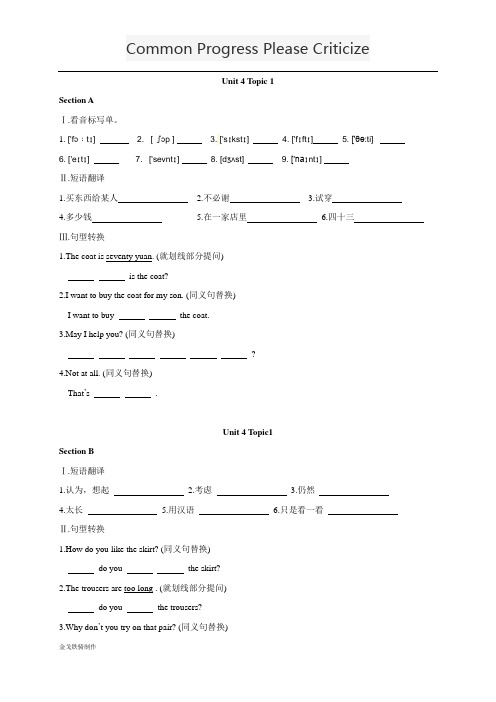
Unit 4 Topic 1Section AⅠ.看音标写单。
1. ['fɔːtɪ]2. [ ʃɔp ]3.['sɪkstɪ]4. ['fɪftɪ]5. ['θə:ti]6. ['eɪtɪ]7. ['sevntɪ]8. [dʒʌst]9. [‘naɪntɪ]Ⅱ.短语翻译1.买东西给某人2.不必谢3.试穿4.多少钱5.在一家店里6.四十三Ⅲ.句型转换1.The coat is seventy yuan. (就划线部分提问)is the coat?2.I want to buy the coat for my son. (同义句替换)I want to buy the coat.3.May I help you? (同义句替换)?4.Not at all. (同义句替换)That’s .Unit 4 Topic1Section BⅠ.短语翻译1.认为,想起2.考虑3.仍然4.太长5.用汉语6.只是看一看Ⅱ.句型转换1.How do you like the skirt? (同义句替换)do you the skirt?2.The trousers are too long . (就划线部分提问)do you the trousers?3.Why don’t you try on that pair? (同义句替换)try on that pair?4.How about the blue coat? (同义句替换)the blue coat?Ⅲ.交际运用:依据对话内容,填写所缺的句子,每空一句。
A: Hello. 1 ?B: I’m just looking , thanks.A: 2 ?B: The trousers are too long.A: Why not try on that pair ?B: 3 .A: They look nice on you.B: 4 , I’ll take it .Unit 4 Topic 1Section CⅠ.看音标写单。
仁爱英语七年级上册unit4topic1知识点练习

What can I do for you? 是服务行业的用语。
商店售货员常用的句式。
2. I want to buy some clothes for my daughter.buy 动词,买,购买buy sth. for sb.= buy sb. sth. 为某人买某物。
3. The clothes are over there, madam.over there 在那边4. Not at all. 不用谢,没关系。
That’s all right. = That’s OK.= You’re welcome.= Not at all.not… at all 一点也不I don’t want to go to school at all.5. Can I try it on?try on 试穿宾语为名词时,可以放在中间,也可以放在on之后。
宾语为代词时,必须放在try与on中间。
•例如:•Please try on this new sweater.= Please try this new sweater on.These are new shoes. Try them on, please.6. How much is it?•How much +be +主语?用来询问价格。
•—How much ____ your coat?•—It’s 300 yuan.—How much ____ these apples?—They are 3 yuan.•How much…?•13---19 的基数词,都以teen结尾。
thirteen, fifteen, eighteen 例外。
•20---90 整十都以ty结尾,twenty,thirty,forty,fifty,eighty例外。
•十位数与个位数之间用“-”•百位数和十位数之间用and.•注意:•200 two hundred•500 five hundred•“hundreds of”概数,数以百计•You can _____ _____ (试穿)the new clothes in many shops.• 3. Mrs. Green b_____ a new schoolbag for her daughter.• 4. The boy ____ _____ (在那边)is my friend, Yukio.• 5. The dress ______ ______ _____ ______ you. (你穿上这条裙子看起来很漂亮).• 1. I have three ______ yuan.A.hundredsB. a hundredC. hundredD. hundreds of• 2. --- The pink cap is nice on you. And it’s only twenty yuan now.--- That’s fine. ______.A.How much is it?B.Not at all.C. I’ll take it.D. Can I try it on?3. --- Can I help you, madam?--- I want a pen ____ my son.A.atB. onC. withD. for4. How much ____ those pants?A. amB. isC. areD. be5. This is a new kind of dress. You can try ______.A. on itB. it onC. in itD. it in2. How do you like the pants?How do you like…? 表示对某物的看法。
仁爱版七年级英语上册【备战宝典】Unit4 Topic1 _必考知识点汇编
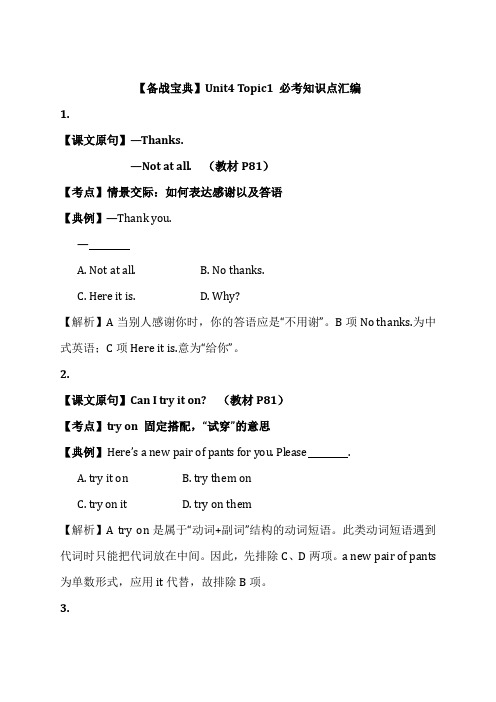
【备战宝典】Unit4 Topic1 必考知识点汇编1.【课文原句】—Thanks.—Not at all. (教材P81)【考点】情景交际:如何表达感谢以及答语【典例】—Thank you.—A. Not at all.B. No thanks.C. Here it is.D. Why?【解析】A当别人感谢你时,你的答语应是“不用谢”。
B项No thanks.为中式英语;C项Here it is.意为“给你”。
2.【课文原句】Can I try it on? (教材P81)【考点】try on 固定搭配,“试穿”的意思【典例】Here’s a new pair of pants for you. Please.A. try it onB. try them onC. try on itD. try on them【解析】A try on是属于“动词+副词”结构的动词短语。
此类动词短语遇到代词时只能把代词放在中间。
因此,先排除C、D两项。
a new pair of pants 为单数形式,应用it代替,故排除B项。
3.【考点】hundred 的用法【典例】There are (有)three and sixty-five days in a year.A. hundredsB. hundredC. hundred ofD. hundreds of【解析】B hundred前有具体数字时,用单数形式。
如果没有具体数字,就用复数形式,并在其后加介词of,即hundreds of,泛指“几百,成百上千”。
4.【考点】数词的用法【典例】—What’s twenty-one and nineteen?—It’s .A. thirteenB. fourteenC. fourtyD. forty【解析】D此句是在问21+19=? forty并不是在four后加ty,而是去掉four 中的u再加ty。
可用“四十无忧(u)”这句话来记。
仁爱版七年级英语上册unit4知识点
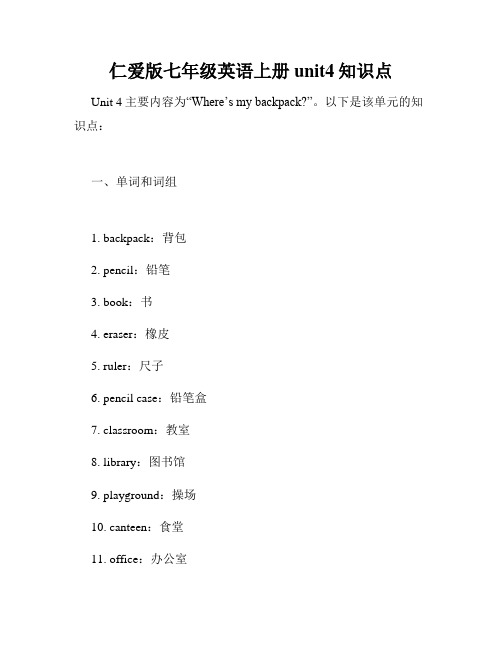
仁爱版七年级英语上册unit4知识点Unit 4主要内容为“Where’s my backpack?”。
以下是该单元的知识点:一、单词和词组1. backpack:背包2. pencil:铅笔3. book:书4. eraser:橡皮5. ruler:尺子6. pencil case:铅笔盒7. classroom:教室8. library:图书馆9. playground:操场10. canteen:食堂11. office:办公室12. restroom:卫生间13. go straight:直走14. turn left/right:向左/右拐15. on the left/right:在左/右边二、句型和语法1. Where’s my backpack?:我的背包在哪里?2. It’s in the classroom.:它在教室里。
3. Where’s my pencil case?:我的铅笔盒在哪里?4. It’s on the desk.:它在桌子上。
5. Where’s the restroom?:卫生间在哪里?6. It’s next to the library.:它在图书馆旁边。
7. Excuse me, where’s the canteen?:请问,食堂在哪里?8. Go straight and turn left.:直走然后向左拐。
9. Where’s the office?:办公室在哪里?10. It’s across from the restroom.:它在卫生间对面。
三、重点词汇解析1. classroom:教室- class:课程,班级- room:房间2. library:图书馆- libr:图书- -ary:表“地方”的后缀3. playground:操场- play:玩,游戏- ground:地面,场地4. canteen:食堂- can:罐头- teen:叫号后缀四、话题练习根据上述知识点,练习以下话题:A. 对话练习1. A: Excuse me, where’s the restroom? B: It’s next to the library.2. A: Where’s my backpack?B: It’s in the classroom.3. A: Where’s the office?B: It’s across from the restroom.4. A: Excuse me, where’s the canteen? B: Go straight and turn left.B. 句型转换1. I am next to the library.: Where am I?2. It’s in the pencil case.: Where’s the eraser?3. He’s in the classroom.: Where’s she?4. They’re on the playground.: Where are we?5. Go straight and turn right.: How can I get to the office?C. 阅读练习My ClassroomHi, my name is Lily. This is my classroom. The backpack is on the desk. The pencil case is under the chair. The book is on the shelf. The eraser is in the pencil case. The ruler is on the desk. I love my classroom.1. Who is talking about the classroom?2. Where is the backpack?3. Where’s the pencil case?4. Where’s the book?5. Is the eraser on the desk?总结:仁爱版七年级英语上册unit4知识点主要涉及单词和词组、句型和语法、重点词汇解析等方面。
仁爱英语七年级上册Unit4,topic1知识点讲解及随堂练习

知识点梳理(一)词汇:1.数词: 21-101 注意: A.forty.eighty; B.读音.~tee..~ty2.名词: 可数名词与不可数名词的划分3.词形变换:als.(同义词)—— too .eac.(同义词)——everykil.(复数)—— kilos . watc.(复数)—— watches mous.(复数)—— mice .expensiv.(同义词)—— dear waite.(对应词)—— waitress . tr.(第三人称单数)—— tries sel.(反义词)—— buy(二)词语与短语:1.try on 试穿2.look nice 看起来很漂亮3.bu.sth.fo.sb..bu.sb.sth.给某人买……4.sel..buy.for…以…价出售.购买5.too long太长too heavy太重6.running shoes跑鞋7.make a shopping list 列购物清单8.run over to…跑到…9.two bags of salt 两包盐two kilos of eggs 两公斤鸡蛋six bottles of milk 六瓶牛奶a bag of rice 一袋米10.pick up购买11.How many+可数复数名词;How much+不可数名词“多少”on the fourth floor 在第四层楼12.Thanks anyway = Thanks all the same. 仍然感谢。
13.Don't worry. 别担心。
(三)功能话题1.购物用语:服务员或营业员: Wha.ca..d.fo.you? Ca..Ma..Coul..hel.you?回答: Yes.please.I'.lik.(t.bu..… .wan..t.bu..…I'.lookin.for… D.yo.have…?2.谈论事物: How do you like…? = What do you think of…?How do you look in this dress? Not bad. How do the pants fit? They're too long. 询问价格:How much is +主语(单数或不可数)? How much are +主语(复数)?How much do you want for something?3.讨论价格: Ho..Wha.abou.thirt.yuan?That'.to.expensive. It'..goo.price. Th.pric.i.good.4.表示感谢: Thanks a lot. Thanks very much. Thanks anyway.回答: Not at all. That's all right. You're welcome.5.请求帮助:Could you do me a favor? = Could you do a favor for me? = Could you help me? 决定与否: I'll take / have / get / buy it.(四)易错点:1.som.常用于肯定句;any常用于否定句或疑问句。
仁爱版英语七年级上册第四单元topic1知识点
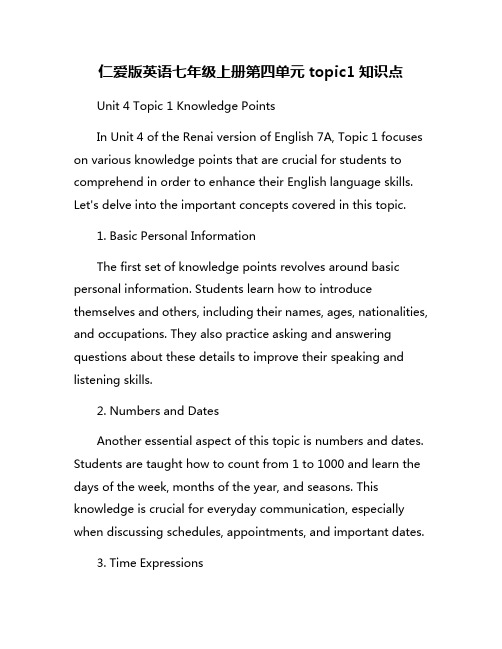
仁爱版英语七年级上册第四单元topic1知识点Unit 4 Topic 1 Knowledge PointsIn Unit 4 of the Renai version of English 7A, Topic 1 focuses on various knowledge points that are crucial for students to comprehend in order to enhance their English language skills. Let's delve into the important concepts covered in this topic.1. Basic Personal InformationThe first set of knowledge points revolves around basic personal information. Students learn how to introduce themselves and others, including their names, ages, nationalities, and occupations. They also practice asking and answering questions about these details to improve their speaking and listening skills.2. Numbers and DatesAnother essential aspect of this topic is numbers and dates. Students are taught how to count from 1 to 1000 and learn the days of the week, months of the year, and seasons. This knowledge is crucial for everyday communication, especially when discussing schedules, appointments, and important dates.3. Time ExpressionsUnderstanding time expressions is also emphasized in Topic 1. Students learn how to read and express time accurately, including telling the time on both analog and digital clocks. Additionally, they practice using prepositions of time such as "at," "on," and "in" to indicate specific moments or periods.4. Descriptions and AdjectivesDescribing people, places, or things is a key skill that students develop in this topic. They acquire a range of adjectives to express physical appearance, personality traits, and emotions. By using descriptive language, students can paint vivid pictures and create detailed narratives in their spoken and written English.5. Simple Present TenseThe simple present tense is another fundamental concept covered in Topic 1. Students learn how to form sentences in the present tense, including affirmative, negative, and interrogative structures. They also practice using present tense verbs correctly and understand the importance of subject-verb agreement.6. Everyday Activities and RoutinesStudents explore vocabulary related to everyday activities and routines in this topic. They learn how to talk about dailytasks, hobbies, and leisure activities using appropriate verbs and adverbs. By discussing their own routines and habits, students can improve their conversational skills and build vocabulary.7. Possessive PronounsPossessive pronouns play a significant role in indicating ownership or relationships. In this topic, students learn how to use possessive pronouns such as "my," "your," "his," "her," "its," "our," and "their" correctly in sentences. They practice expressing possession and identifying the correct forms based on the context.8. Comparatives and SuperlativesComparing and contrasting different things is another skill that students hone in Topic 1. They learn how to form comparatives (e.g., "bigger," "faster," "more interesting") and superlatives (e.g., "biggest," "fastest," "most interesting") to describe differences in size, speed, or quality. By mastering these structures, students can express opinions and make comparisons effectively.In conclusion, Topic 1 of Unit 4 in the Renai version of English 7A covers a wide range of essential knowledge points that are vital for students to build a strong foundation in Englishlanguage learning. By mastering these concepts, students can enhance their communication skills, expand their vocabulary, and improve their overall proficiency in English.。
仁爱版七年级英语上册Unit4知识点总结
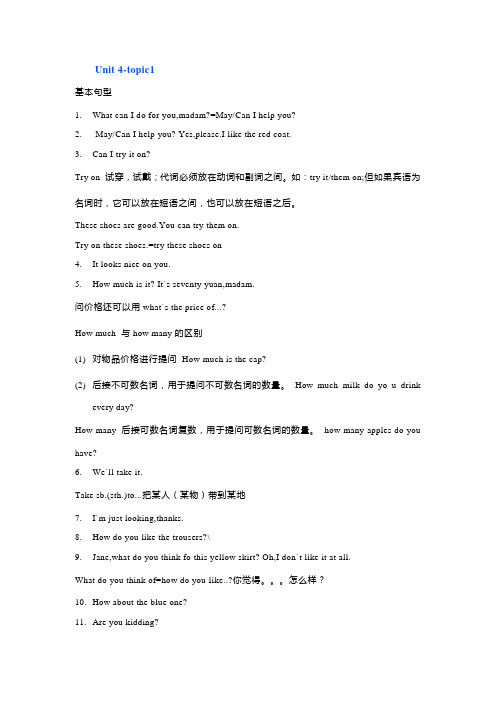
Unit 4-topic1基本句型1.What can I do for you,madam?=May/Can I help you?2.-May/Can I help you? Yes,please.I like the red coat.3.Can I try it on?Try on 试穿,试戴;代词必须放在动词和副词之间。
如:try it/them on;但如果宾语为名词时,它可以放在短语之间,也可以放在短语之后。
These shoes are good.You can try them on.Try on these shoes.=try these shoes on4.It looks nice on you.5.How much is it? It`s seventy yuan,madam.问价格还可以用what`s the price of...?How much 与how many的区别(1)对物品价格进行提问How much is the cap?(2)后接不可数名词,用于提问不可数名词的数量。
How much milk do yo u drinkevery day?How many 后接可数名词复数,用于提问可数名词的数量。
how many apples do you have?6.We`ll take it.Take sb.(sth.)to...把某人(某物)带到某地7.I`m just looking,thanks.8.How do you like the trousers?\9.Jane,what do you think fo this yellow skirt? Oh,I don`t like it at all.What do you think of=how do you like..?你觉得。
怎么样?10.How about the blue one?11.Are you kidding?12.Thank you all the same.=Thank you anyway仍然谢谢你13.Could you help me do some shopping,Ben? Sure.14.I want to buy some clothes for my daughter.Buy sth.for sb.=buy sb. Sth.My mom buys a a schoolbag for me.=My mom buys me a schoolbag.15.Oh,we don`t have any milk.Some 与any 的区别Any意为“一些”,一般用于否定句和疑问句中,通常也修饰不可数名词和可数名词的复数。
最新仁爱英语七年级上册unit4topic1知识总结及同步练习【优质】
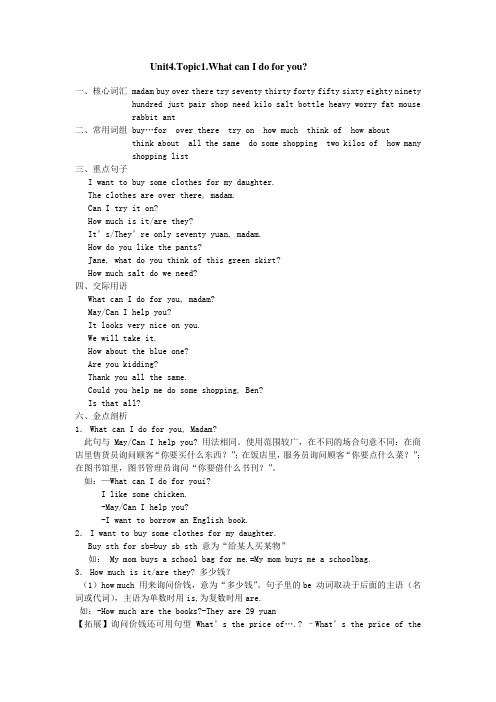
Unit4.Topic1.What can I do for you?一、核心词汇 madam buy over there try seventy thirty forty fifty sixty eighty ninetyhundred just pair shop need kilo salt bottle heavy worry fat mouserabbit ant二、常用词组 buy…for over there try on how much think of how aboutthink about all the same do some shopping two kilos of how many shopping list三、重点句子I want to buy some clothes for my daughter.The clothes are over there, madam.Can I try it on?How much is it/are they?It’s/They’re only seventy yuan, madam.How do you like the pants?Jane, what do you think of this green skirt?How much salt do we need?四、交际用语What can I do for you, madam?May/Can I help you?It looks very nice on you.We will take it.How about the blue one?Are you kidding?Thank you all the same.Could you help me do some shopping, Ben?Is that all?六、金点剖析1.What can I do for you, Madam?此句与May/Can I help you? 用法相同。
仁爱版七年级上册英语-Unit4:Topic1单词汇总+知识梳理

仁爱七上-Unit4 Topic1【重点短语和句型】1. b u y s t h.fo r s b. =bu y s b. s t h. 为某人买……Li n d a w an t s t o bu y a t o y c a r f o r h e r co us i n. =Li n d a w ant s t o b u y h e r co usi n a t o y c a r.2. t r y o n st h.= t r y s t h. o n 试穿t r y i t/t h em on(固定搭配)M a ri a t ri es o n t h e c o a t i n a cl o t h e s s ho p.3. T h e c oa t l o oks ve r y n i c e o n yo u. 你穿上这件外套真漂亮。
4. T h at’s fi n e. We’l l t ak e i t. 好的,我们就买它了。
5.I a m j u st l o ok i ng.我只是随便看看。
6.“Ar e yo u k i d di n g?”你在开玩笑吗?7. t h i n k 想,认为t hi nk a bo ut考虑t hi nk o f 认为K a n gk a n g t h i n ks i t’s Li Mi n g’s.I’l l t h i n k a bo ut i t. 我要考虑一下。
t hi nk a bo ut a pl an 考虑一项计划W h a t do yo u t h i n k o f t hi s ye l l o w sk i rt?8. T h an k yo u al l t he s am e. 仍然感谢你。
9.get s om e w at e 取水f l y a ki t e / k i t es放风筝s i n g som e s on gs唱歌m e et fr i en ds a t hom e 在家和朋友见面h a v e a pi c ni c=go (o ut) f o r a pi c ni c 去野餐ge t up 起床go h om e 回家go f i s hi n g 去钓鱼go sh op pi n g=do s om e s ho ppi n g 购物go t o t he z o o 去动物园go t o t he Wes t Hi l l去西山v i si t a f r i e nd 拜访朋友c a l l … b a c k 回电话d o o ne’s h ome wo rk 做作业t a k e on e’s or d e r点菜t a k e s om e b r e ad 带一些面包s e e t h e M on k e y S ho w 看猴子表演10. as k s b. t o d o s t h. 请/要某人做某事C ou l d yo u a sk h e r t o c a l l m e ba c k t hi s e v e ni n g?你能让她今晚给我回个电话吗?11. n e ed st h. /t o do s t h. 需要(做)某事We n e ed t o h el p t he m w i t h t h ei r En gl i s h. 我们需要帮助他们学英语。
七年级上册英语unit4topic1笔记

七年级上册英语unit4topic1笔记
以下是七年级上册英语Unit 4 Topic 1的笔记,希望对您有所帮助。
Unit 4 Topic 1
一、重点单词
1. subject 学科
2. English 英语
3. math 数学
4. Chinese 语文
5. physics 物理
6. chemistry 化学
7. history 历史
8. biology 生物
9. geography 地理
10. 体育
二、重点短语
1. have English class 上英语课
2. like English 喜欢英语
3. my favorite subject 我最喜欢的科目
4. because of 因为
5. the most interesting 最有趣的
6. very useful 非常有用的
7. after class 下课后
8. have a test 进行测试
9. easy to learn 容易学习
10. hard to understand 难以理解
三、重点句子
1. What’s your favorite subject? 你最喜欢的科目是什么?
2. My favorite subject is English. 我最喜欢的科目是英语。
3. Why do you like English? 你为什么喜欢英语?
4. Because it’s interesting and useful. 因为它既有趣又有用。
5. I have an English class every Tuesday. 我每周二都有一节英语课。
仁爱版英语七年级上册 Unit 4 Topic 1 What can I do for you_ S

English Learning Guide for Grade 7Unit 4 Topic 1 What can I do for you? Section A【学习目标】1.复习数字1-19,学习数字20-999的表达。
2.学习掌握How much询问价格以及其他购物用语。
【学习重难点】学习掌握How much询问价格以及其他购物用语。
【学习过程】一.Daily Recitation 日日诵1.--What do you usually have for breakfast? 你早上通常吃什么?2.--I usually have milk and bread for breakfast. 我早上通常吃牛奶和面包。
3.--May I take your order, sir? 我能帮你点餐吗,先生?4.--Fish with vegetables and rice, please. 鱼肉炒青菜和米饭,谢谢。
5.--Would you like something to drink? 你想来点喝的东西吗?--Yes. A glass of apple juice,please. / No, thanks. 是的,请给我一杯苹果汁。
/不了,谢谢。
6.--What would you like to eat? --Let me see. 你想吃点什么?--让我想一下。
7.--Why not have some fish and eggs? --Good idea. --何不来点鱼肉和鸡蛋呢?--好主意!8.--Help yourself/yourselves to some fish. --请随便吃些鱼吧!二.New lesson新课学习1. 学习数字表达21-999,完成2a。
(P82)2. 听录音,完成2b。
3. 听听力,完成以下选择题,()(1)What does Maria’s mother want to buy?A. Shoes.B. ClothesC. Gloves()(2)What color of coat does Maria try?A. YellowB. GreenC. Red()(3)How much is the coat?A. It’s seven yuan.B. It’s seventeen yuan.C. It’s seventy yuan.4.跟读录音,熟读1a并背诵。
仁爱英语七年级上册Unit4Topic1知识讲解
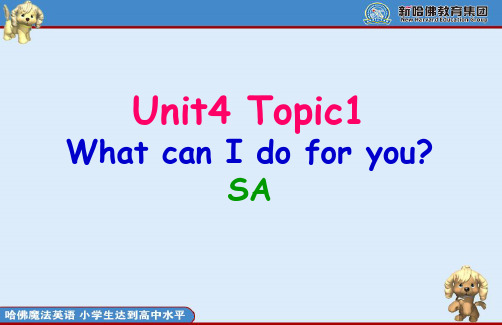
• 5. The dress _lo_o__k_s_ _v_e_r_y__
_n_i_c_e_ __o_n___ you. (你穿上这条
裙子看起来很漂亮).
• 1. I have three ______ yuan. A.hundreds B. a hundred C. hundred D. hundreds of
all.
• 5. Can I try it on?
•try on 试穿
• 宾语为名词时,可以放在中间, 也可以放在on之后。
• 宾语为代词时,必须放在try与on 中间。
• 例如: • Please try on this new sweater. • = Please try this new sweater on.
• 十位数与个位数之间用“-”
• 百位数和十位数之间用and.
• 注意: • 200 two hundred • 500 five hundred
• “hundreds of” 概数,数以百计
•thirteen 重读在teen. •thirty 重读在 thir.
• 1. Seventy- five and five is
• madam,夫人,女士。用于 对陌生女士或长辈的尊称。
•男士称为:sir。
• 2. I want to buy some clothes for my daughter.
•buy 动词,买,购买
• buy sth. for sb. • = by sb. sth. 为某人买某物。 • 和give的用法类似。
• These are new shoes. Try them on, please.
七年级英语上册《unit 4 having fun》topic 1 what can i do for you练习(含解析) (新版)仁爱版
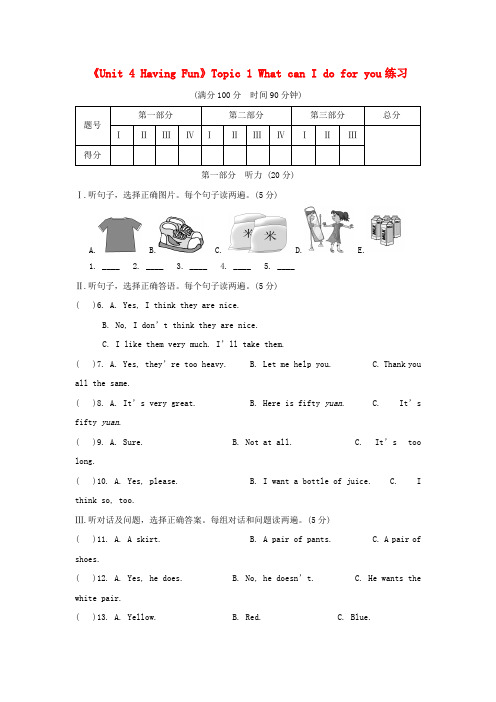
《Unit 4 Having Fun》Topic 1 What can I do for you练习(满分100分时间90分钟)第一部分听力 (20分)Ⅰ.听句子,选择正确图片。
每个句子读两遍。
(5分)A. B. C. D. E.1. ____2. ____3. ____4. ____5. ____Ⅱ.听句子,选择正确答语。
每个句子读两遍。
(5分)( )6. A. Yes, I think they are nice.B. No, I don’t think they are nice.C. I like them very much. I’ll take them.( )7. A. Yes, they’re too heavy. B. Let me help you. C. Thank you all the same.( )8. A. It’s very great. B. Here is fifty yuan. C. It’s fifty yuan.( )9. A. Sure. B. Not at all. C. It’s too long.( )10. A. Yes, please. B. I want a bottle of juice. C. I think so, too.Ⅲ.听对话及问题,选择正确答案。
每组对话和问题读两遍。
(5分)( )11. A. A skirt. B. A pair of pants. C. A pair of shoes.( )12. A. Yes, he does. B. No, he doesn’t. C. He wants the white pair.( )13. A. Yellow. B. Red. C. Blue.( )14. A. Eight. B. Six. C. Two.( )15. A. It’s too long. B. It’s too small. C. It’s too big.Ⅳ.听对话,选择正确答案。
- 1、下载文档前请自行甄别文档内容的完整性,平台不提供额外的编辑、内容补充、找答案等附加服务。
- 2、"仅部分预览"的文档,不可在线预览部分如存在完整性等问题,可反馈申请退款(可完整预览的文档不适用该条件!)。
- 3、如文档侵犯您的权益,请联系客服反馈,我们会尽快为您处理(人工客服工作时间:9:00-18:30)。
What can I do for you? 是服务行业的用语。
商店售货员常用的句式。
2. I want to buy some clothes for my daughter.buy 动词,买,购买buy sth. for sb.= buy sb. sth. 为某人买某物。
3. The clothes are over there, madam.over there 在那边4. Not at all. 不用谢,没关系。
That’s all right. = That’s OK.= You’re welcome.= Not at all.not… at all 一点也不I don’t want to go to school at all.5. Can I try it on?try on 试穿宾语为名词时,可以放在中间,也可以放在on之后。
宾语为代词时,必须放在try与on中间。
•例如:•Please try on this new sweater.= Please try this new sweater on.These are new shoes. Try them on, please.6. How much is it?•How much +be +主语?用来询问价格。
•—How much ____ your coat?•—It’s 300 yuan.—How much ____ these apples?—They are 3 yuan.•How much…?•13---19 的基数词,都以teen结尾。
thirteen, fifteen, eighteen 例外。
•20---90 整十都以ty结尾,twenty,thirty,forty,fifty,eighty例外。
•十位数与个位数之间用“-”•百位数和十位数之间用and.•注意:•200 two hundred•500 five hundred•“hundreds of”概数,数以百计•You can _____ _____ (试穿)the new clothes in many shops.• 3. Mrs. Green b_____ a new schoolbag for her daughter.• 4. The boy ____ _____ (在那边)is my friend, Yukio.• 5. The dress ______ ______ _____ ______ you. (你穿上这条裙子看起来很漂亮).• 1. I have three ______ yuan.A.hundredsB. a hundredC. hundredD. hundreds of• 2. --- The pink cap is nice on you. And it’s only twenty yuan now.--- That’s fine. ______.A.How much is it?B.Not at all.C. I’ll take it.D. Can I try it on?3. --- Can I help you, madam?--- I want a pen ____ my son.A.atB. onC. withD. for4. How much ____ those pants?A. amB. isC. areD. be5. This is a new kind of dress. You can try ______.A. on itB. it onC. in itD. it in2. How do you like the pants?How do you like…? 表示对某物的看法。
= What do you think of…?How do you like this dress?= What do you think of this dress?5. How about the blue one?How about…? = What about…?•用于询问或征求意见。
•How about + 名词?•How about + doing sth.?•例如:•I’d like some fish.How about you?•How about eating out?--- How do you like my T-shirt?--- _____.A.All right.B. It looks nice.C. Thank you.D. It’s 280 yuan.•---- _____ are they?---- They are 5 yuan.A.WhoseB. How muchC. How oldD. What•--- What do you _____ the blue pants?---- They are _____ short.A.like; tooB. think of; tooC. like; veryD. think of; a lot of•--- Excuse me. How do you spell “pair”?--- Sorry. I don’t know.--- ______.A.Not at all.B. Thank you all the same.This pair of pants_____ blue. I like ____ very much.A. is; itB. are; themC. is; themD. are; it1. What do you _______ _____ (认为)the dress?2. Why not _____ _____ (试穿)that blue pair?3. Mary, your dress is ______ ______ (太长).4. I _____ like it _____ _____.(根本不,一点也不)5. --- Can I help you?--- We’re _____ ______ (只是看看), thanks.6. I’ll ______ _______ (考虑)that yellow jacket.1. Could you help me do some shopping?do some shopping 购物,买东西go shopping 购物shop 名词,商店shop 作动词指购物,买东西2. We need two kilos of apples and some salt.need 需要,need + 名词need to +动词kilo 千克two kilos of…两千克……•量的表达:1. 数词+容器+ofI’d like two bottles of water.2. 数词+表示量的名词+ofPlease give me a piece of bread.若修饰的名词为不可数名词,表示数量的时候,复数在量词上改变。
a bag of saltthree bags of salt• 6. Don’t worry.祈使句:以动词原形开头,表示命令语气的句子。
祈使句的否定:句子开头用Don’tworry 为不及物动词。
担心某事:worry aboutworried为其形容词形式,常与about 连用。
I am worried about my mother.6. How many…?与How much…?•How many…? 询问可数名词有多少•How much…? 询问不可数名词有多少?/ 询问价钱。
1.--- What can I do for you?--- I’d like two _____.A.boxes of applesB.box of applesC.boxes of apple2.You can buy some school things in a _____.A.hospitalB. shopC. schoolD. park3.--- Would you like some orange juice?---No, thank you.--- ____ some milk?--- OK. Thanks.A. How aboutB. How muchC. WhatD. What is4.--- How many _____ do we ___?--- Six bottles.A. bottle; needB. bottle; needsC. bottles; needD. bottles; needs5.--- Some vegetables, a bag of rice and two kilos of eggs. Is that all?--- I think ____.A. soB. thatC. itD. this6.Don’t worry ____ him. He is OK.A. ofB. forC. onD. about7.Could you please help me to do some s________, Ben?8.Don’t w_______. I can help you.9.The bag of rice is too h_______. Can you help me?10.We don’t have any milk. We n_____ some for supper.11.--- What would you like then, Mr. Cat?--- I’d like a fat m _____.I’d like to buy ______ _____ _____ ______. (2千克盐)名词分为可数名词和不可数名词。
a, an 只能表示一个,修饰可数名词。
some,many 用来修饰可数名词的许多。
不可数名词不能用a, an 来修饰。
some,much用来修饰不可数名词有许多不可数名词做主语时,谓语用单数。
例如:•Some bread is on the table询问数量:How many + 可数名词。
How many apples are there?How much + 不可数名词。
How much water are there ?We don’t have any milk.•some 与any 的区别:some, any都表示“一些”,some 用在肯定句中表示一些。
any 在疑问句和否定句中表示“一些”•注意:在疑问句中,表示“请求,建议”语气的时候,也用some.例如:Why not do some shopping?May I ask you some questionssome 既可以用来修饰可数名词,也可以用来修饰不可数名词。
